The Library SysLibSockets.lib
The Library SysLibSockets.lib
If the target system supports the functionality, this library supports the access on sockets for the
communication via TCP_IP and UDP.
The library functions each call the correspondent function of the currently used operating system.
Therefore please see the help system of the currently used operating system for detailled
information on the particular OS functions.
The functions, arranged alphabetically:
· SysSockAccept
· SysSockBind
· SysSockClose
· SysSockConnect
· SysSockCreate
· SysSockGetHostByName
· SysSockGetHostName
· SysSockGetOption
· SysSockHtonI
· SysSockHtons
· SysSockInetAddr
· SysSockInetNtoa
· SysSockloctl
· SysSockListen
· SysSockNtohI
· SysSockNtohs
· SysSockSelect
· SysSockSetIPAddress
· SysSockSetOption
· SysSockShutdown
TCP specific:
· SysSockRecv, SysSockSend
UDP specific:
· SysSockRecvFrom,
· SysSockSendTo
© 3S – Smart Software Solutions GmbH / 16.12.2002
1
�
The Library SysLibSockets.lib
SysSockAccept
This function of type DINT calls the function accept of the operating system in order to accept a
connection request to the socket. A new descriptor (handle) for the socket will be returned. The orignal
socket will be reset to the "listening" status (see SysSockListen).
Data type
Description
A descriptor identifying a socket that has been placed in a listening
state with the SysSockListen function. The connection will actually
be made with the socket that is returned by the SysSockListen
function. The requested connection then will be made with that
socket, for which the SysSockAccept function returns a handle.
(corresponding parameter e.g. in Win32:s)
Pointer to a variable of type SOCKADDR; will be filled with the
address of the caller.
(corresponding parameter e.g. in Win32: addr)
Length of the structure SockAddr (can be retrieved via the SIZEOF
operator)
(corresponding parameter e.g. in Win32: addrlen)
Variable
diSocket
DINT
pSockAddr
DWORD
diSocketAddrSize DINT
Structure SOCKADDR:
INT;
UINT;
UDINT;
ARRAY [0..7] OF SINT;
sin_family :
sin_port :
sin_addr :
sin_zero :
(* Adress-family, defines address format, *)
(* Port of the connection requesting unit *)
(* IP-address of the requesting unit *)
(* buffer *)
SysSockBind
This function of type BOOL calls the function bind of the operating system. This function will allocate a
local address to the socket which was assigned before just to an address range by SysSockCreate. Usually
the "binding" will be done before functions like SysSockListen or SysSockAccept are called for a socket.
In case of successful operation the function will return TRUE, otherwise FALSE.
Variable
diSocket
Data type
Description
DINT
Descriptor of the socket, returned by SysSockCreate
(corresponding parameter e.g. in Win32: s)
pSockAddr
DWORD
Pointer to a variable of type SOCKADDR; (see
SysSockAccept)
diSockAddrSize
DINT
Lenght of the structure SOCKADDR (can be retrieved with the
aid of the SIZEOF operator)
2
© 3S – Smart Software Solutions GmbH / 16.12.2002
�
SysSockClose
The Library SysLibSockets.lib
This function of type BOOL calls the function closesocket of the operating system, in order to close a
socket.
In case of successful operation the function will return TRUE, otherwise FALSE.
Variable
diSocket
Data type
Description
DINT
Descriptor of the socket, returned by SysSockCreate
(corresponding parameter e.g. in Win32: s)
SysSockConnect
This function of type BOOL calls the function connect of the operating system. In case the socket has not
yet been "bound" by the SysSockBind function (see above), now automatically a local address will be
assigned to it. Afterwards the socket will be ready to send and /or receive data.
In case of successful operation the function will return TRUE, otherwise FALSE.
Variable
diSocket
Data type
Description
DINT
Descriptor of the socket, returned by SysSockCreate
(corresponding parameter e.g. in Win32: s)
pSockAddr
DWORD
Pointer auf eine Variable vom Typ SOCKADDR;
(see SysSockAccept)
diSockAddrSize
DINT
Length of the structure SOCKADDR (can be retrieved with the
aid of the SIZEOF operator)
SysSockCreate
This function of type DINT calls the function socket of the operating system. A new socket will be created
and assigned to a Service Provider.
The function returns the descriptor of the new socket, which is used as input parameter in other functions
of the library, e.g. SysSockBind, SysSockConnect.
Variable
Data type
Description
diAddressFamily
DINT
diType
DINT
Address family
(corresponding parameter e.g. in Win32: af)
One of the following two types can be used e.g. for Windows Sockets
1.1: SOCK_STREAM, SOCK_DGRAM
(corresponding parameter e.g. in Win32: type)
diProtocol
DINT
Protocol, depending on the chosen address family
(corresponding parameter e.g. in Win32: protocol)
© 3S – Smart Software Solutions GmbH / 16.12.2002
3
�
SysSockGetHostByName
The Library SysLibSockets.lib
This function of type DWORD calls the function hostGetByName (VxWorks) resp. gethostbyname
(win32) of the operating system.
In case of
return
SOCKET_INADDR_NONE (defined in the library as a global constant).
successful operation
the
function will
the host address, otherwise
Variable
Data type
Description
stHostName
POINTER TO STRING
Name of the host
(corresponding parameter e.g. in Win32: name)
SysSockGetHostName
This function of type BOOL calls the function gethostname of the operating system auf and returns the
host name.
In case of successful operation the function will return TRUE, otherwise FALSE.
Variable
Data type
Description
stHostName
STRING
diNameLength
DINT
Host name
(corresponding parameter e.g. in Win32: name)
Length of the host name
(corresponding parameter e.g. in Win32: buflen)
SysSockGetOption
This function of type BOOL calls the function getsockopt of the operating system, in order to get the
value of a particular socket option.
In case of successful operation the function will return TRUE, otherwise FALSE.
Variable
diSocket
diLevel
Data type
Description
DINT
DINT
Descriptor of the socket, returned by SysSockCreate
(corresponding parameter e.g. in Win32: s)
protocol specific level; possible values: SOL_SOCKET,
IPPROTO_TCP
(corresponding parameter e.g. in Win32: level)
diOption
DINT
Name of the option, for which you want to get the current value;
see function SysSockSetOption for a list of the options
(corresponding parameter e.g. in Win32: optname)
4
© 3S – Smart Software Solutions GmbH / 16.12.2002
�
The Library SysLibSockets.lib
diOptionValue
DWORD
diOptionLength
DWORD
Pointer to the variable, to which the current value of the option
should be written
(corresponding parameter e.g. in Win32: optval)
Pointer to the size of the variable, to which the current value of the
option should be written
(corresponding parameter e.g. in Win32: optlen)
SysSockHtons
This function of type WORD calls the function htons of the operating system, which converts a short
value from host byte order to TCP/IP network order.
The function returns the converted value.
For a description of this function please see the Online Help resp. documentation on the operating system.
Variable
Data type
Description
wHost
WORD
Value to be converted.
SysSockInetAddr
This function of type DWORD calls the function inet_addr of the operating system, which converts a
string containing an internet address to an address which can be used in the IN_ADDR structure.
The function returns the converted address.
Variable
stIPAddr
Data type
Description
STRING
IP address (dotted notation)
(corresponding parameter e.g. in Win32: cp)
© 3S – Smart Software Solutions GmbH / 16.12.2002
5
�
The Library SysLibSockets.lib
SysSockInetNtoa
This function of type BOOL calls the function inet_ntoa (Win32) bzw. inet_ntoa_b (VxWorks), which
converts an Internet network address to a string in Internet standard format..
In case of successful operation the function will return TRUE, otherwise FALSE.
Variable
Data type
Description
pInAddr
INADDR
Pointer to structure INADDR, which contains the Internet address,
see below
(corresponding parameter e.g. in Win32: in)
stIPAddr
STRING
IP address
diIPAddrSize
DINT
Size of the IP address
Struktur INADDR:
S_addr : DWORD; (* Internet-Adresse als DWORD *)
This function of type DINT calls the function ioctl of the operating system in order to control the I/O
mode of the socket.
In case of successful operation the function will return TRUE, otherwise FALSE.
Variable
Data type
Description
diSocket
DINT
diCommand
DINT
Descriptor of the socket, returned by SysSockCreate
(corresponding parameter e.g. in Win32: s)
Command which you want to apply on the socket.
(corresponding parameter e.g. in Win32: cmd). Valid commands are:
SOCKET_FIONBIO, SOCKET_FIONREAD.
piParameter
DWORD
Pointer to the command parameter
(corresponding parameter e.g. in Win32: argp
SysSockIoctl
6
© 3S – Smart Software Solutions GmbH / 16.12.2002
�
The Library SysLibSockets.lib
SysSockListen
This function of type BOOL calls the function listen of the operating system. This function will cause the
socket to listen to connection requests and to queue them until they can be accepted by the
SysSocketAccept function.
In case of successful operation the function will return TRUE.
As soon as the maximum number of connection requests in the queue is exceeded the function will return
FALSE.
Variable
diSocket
Data type
Description
DINT
Descriptor of the socket, returned by SysSockCreate
(corresponding parameter e.g. in Win32: s)
diMaxConnections
DINT
Maximum number of connection requests, which can be put in
the input queue of the socket.
(corresponding parameter e.g. in Win32: backlog)
SysSockNtohl
SysSockNtohs
This function of type DWORD calls the function ntohl of the operating system, which converts a u_long
value of the TCP/IP network order to the host byte order.
The function will return the value in host byte order.
Variable
dwNet
Data type
Description
DWORD
u_long value to be converted
(corresponding parameter e.g. in Win32: netlong)
This function of type WORD calls the function ntohs of the operating system, which converts a u_short
value from the TCP/IP network order to the host byte order.
The function will return the value in host byte order.
Variable
wNet
Data type
Description
WORD
u_short value to be converted
(corresponding parameter e.g. in Win32: netshort
© 3S – Smart Software Solutions GmbH / 16.12.2002
7
�
SysSockSelect
The Library SysLibSockets.lib
This function of type BOOL calls the function select of the operating system to check whether one or
several sockets are ready for certain communication actions. The group of sockets, to which this request
should be applied, can be defined via the structure SOCKET_FD_SET.
The function will return the result of the select function.
Variable
Data type
Description
diWidth
fdRead
DINT
DWORD
fdWrite
DWORD
fdExcept
DWORD
ptvTimeout DWORD
Size of structure SOCKET_FD_SET.
Optionally a pointer to the structure defining the socket set for which the
status of the read actions should be checked. You also can pass 0.
Structure SOCKET_FD_SET see below
(corresponding parameter e.g. in Win32: readfds)
Optionally a pointer to the structure, defining the socket for which the
status of the write actions should be checked. You also can pass 0.
Structure SOCKET_FD_SET see below
(corresponding parameter e.g. in Win32: writefds)
Optionally a pointer to the structure, defining the socket for which the
error status should be checked. You also can pass 0. Structure
SOCKET_FD_SET see below
(corresponding parameter e.g. in Win32: exceptfds)
Maximum time which the SysSockSelect function will wait for an answer;
Structure SOCKET_TIMEVAL, see below
(corresponding parameter e.g. in Win32:timeout)
Structure SOCKET_FD_SET
fd_count:
UDINT;
(* Number of sockets *)
fd_array:
ARRAY [0..63] OF DINT;
(* Field with socket descriptors *)
Structure SOCKET_TIMEVAL:
tv_sec:
tv_usec:
DINT;
DINT;
(* seconds *)
(* microseconds *)
8
© 3S – Smart Software Solutions GmbH / 16.12.2002
�
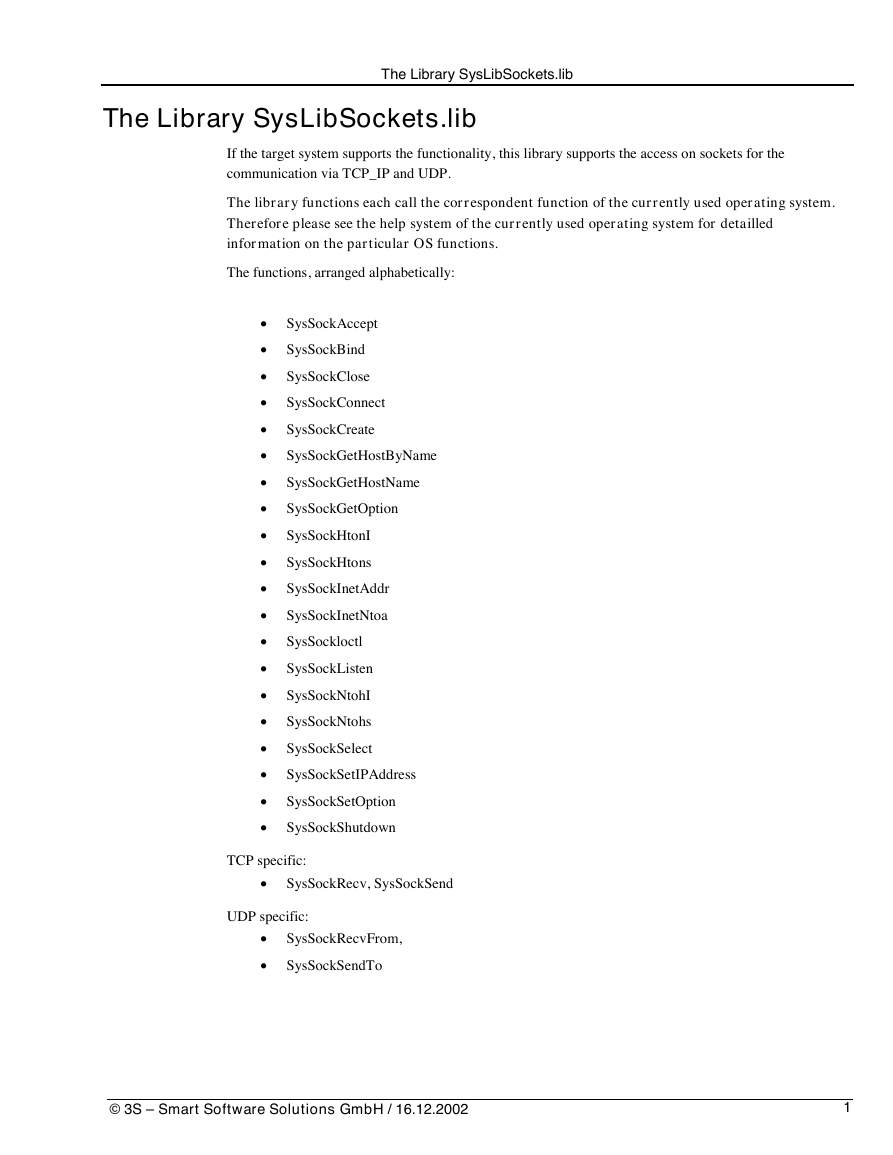
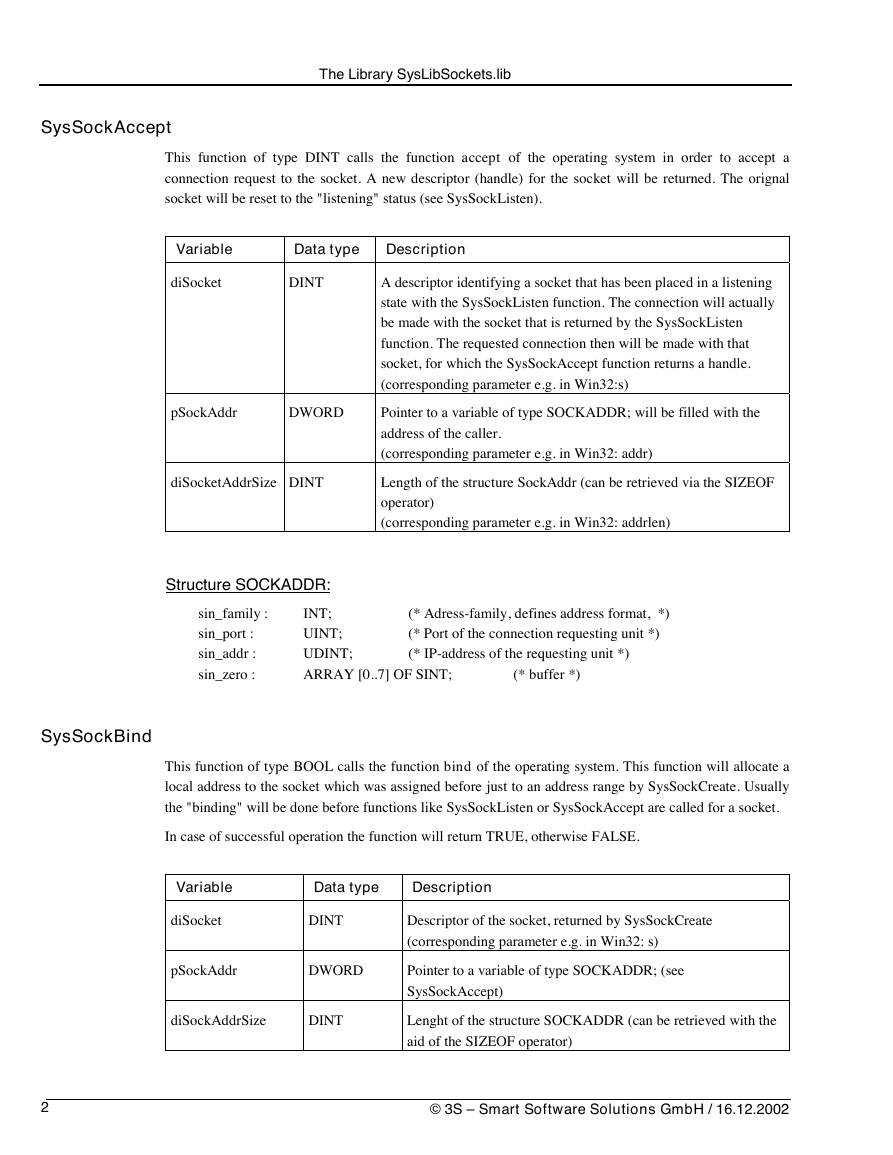
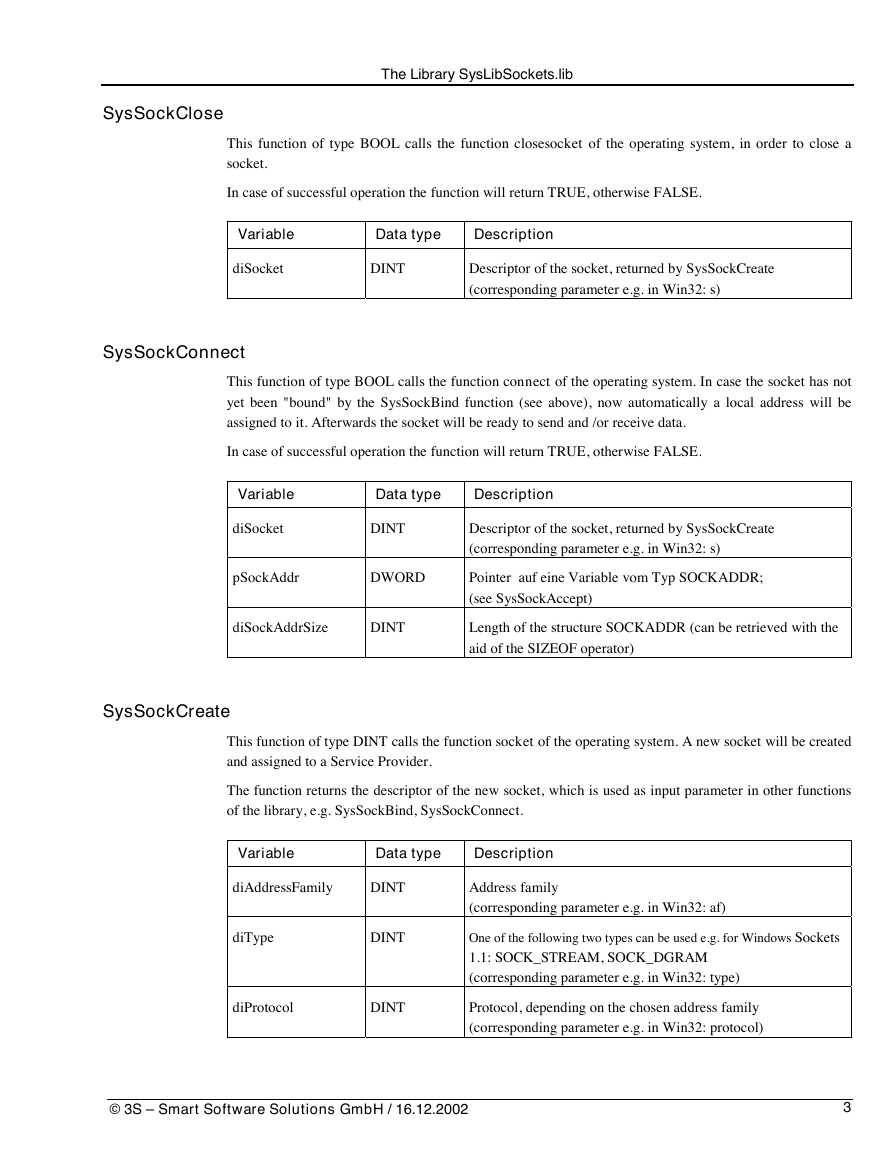

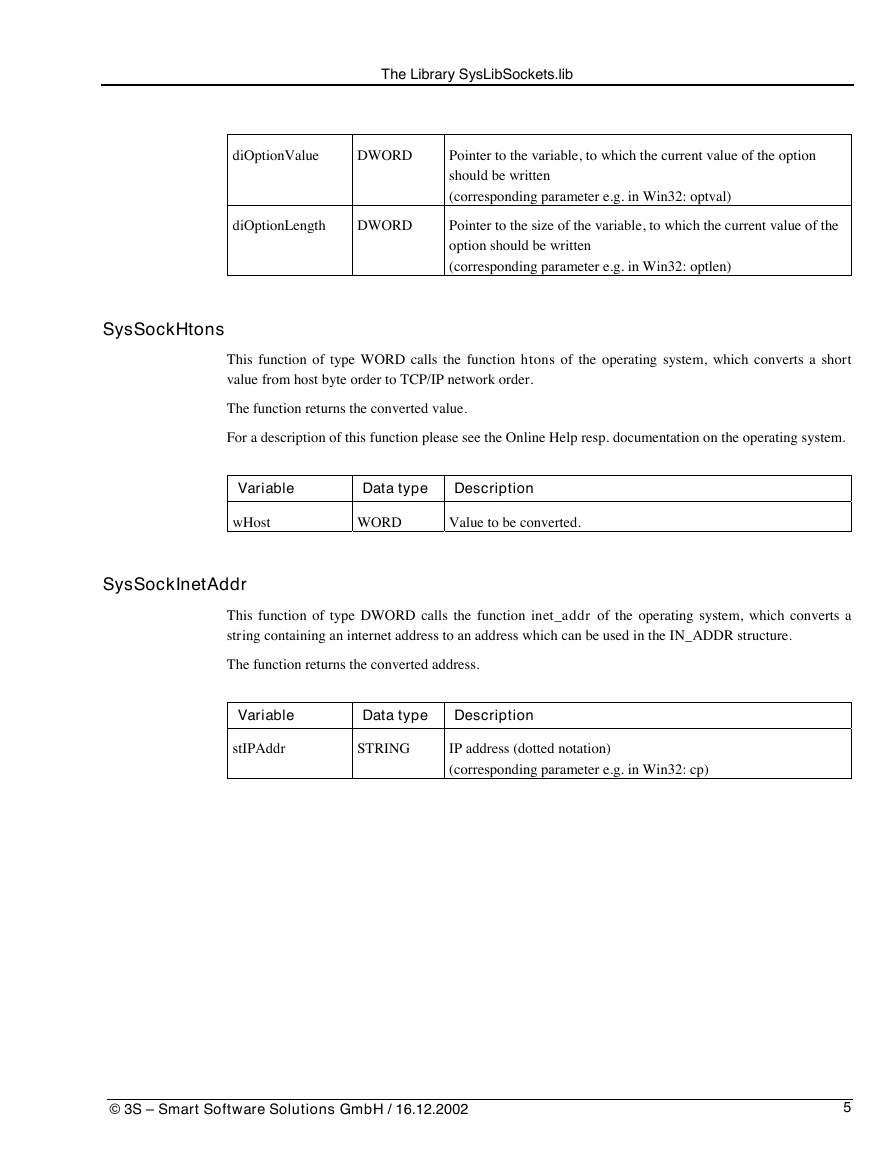
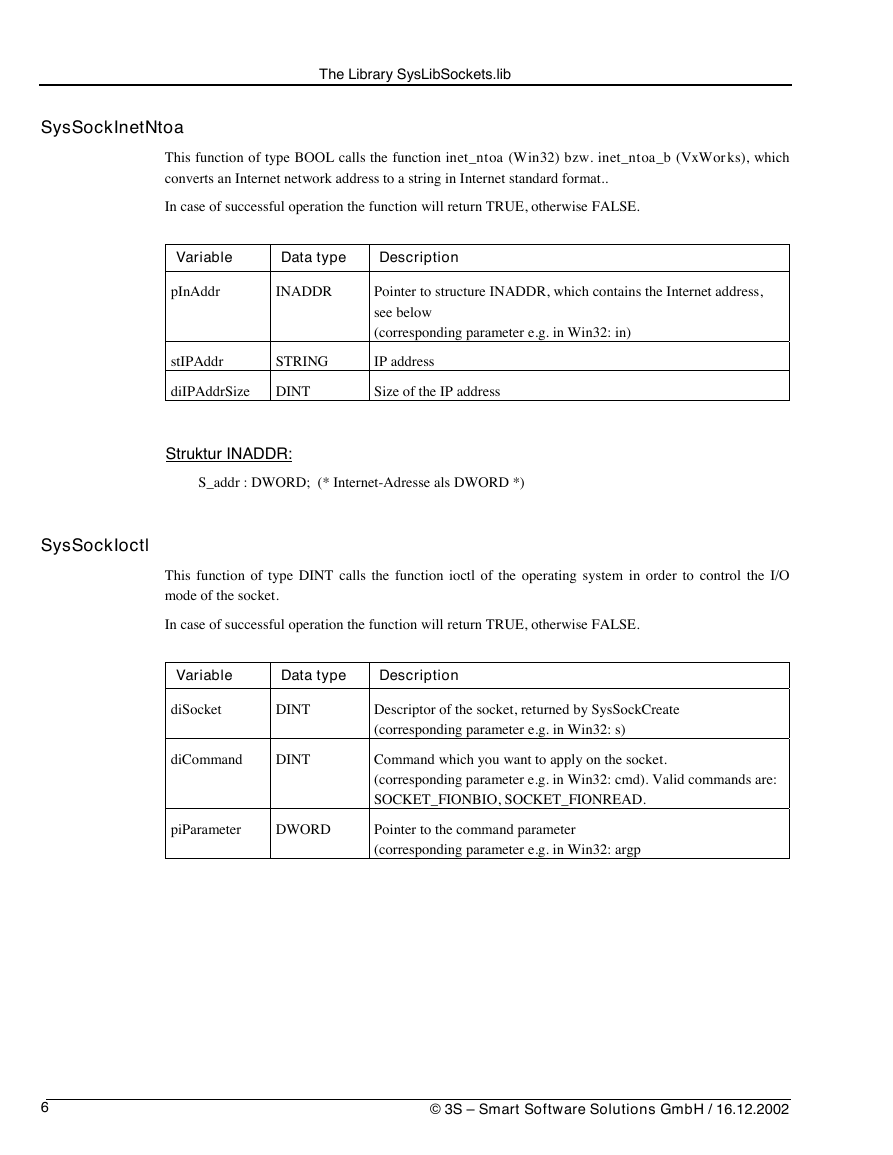
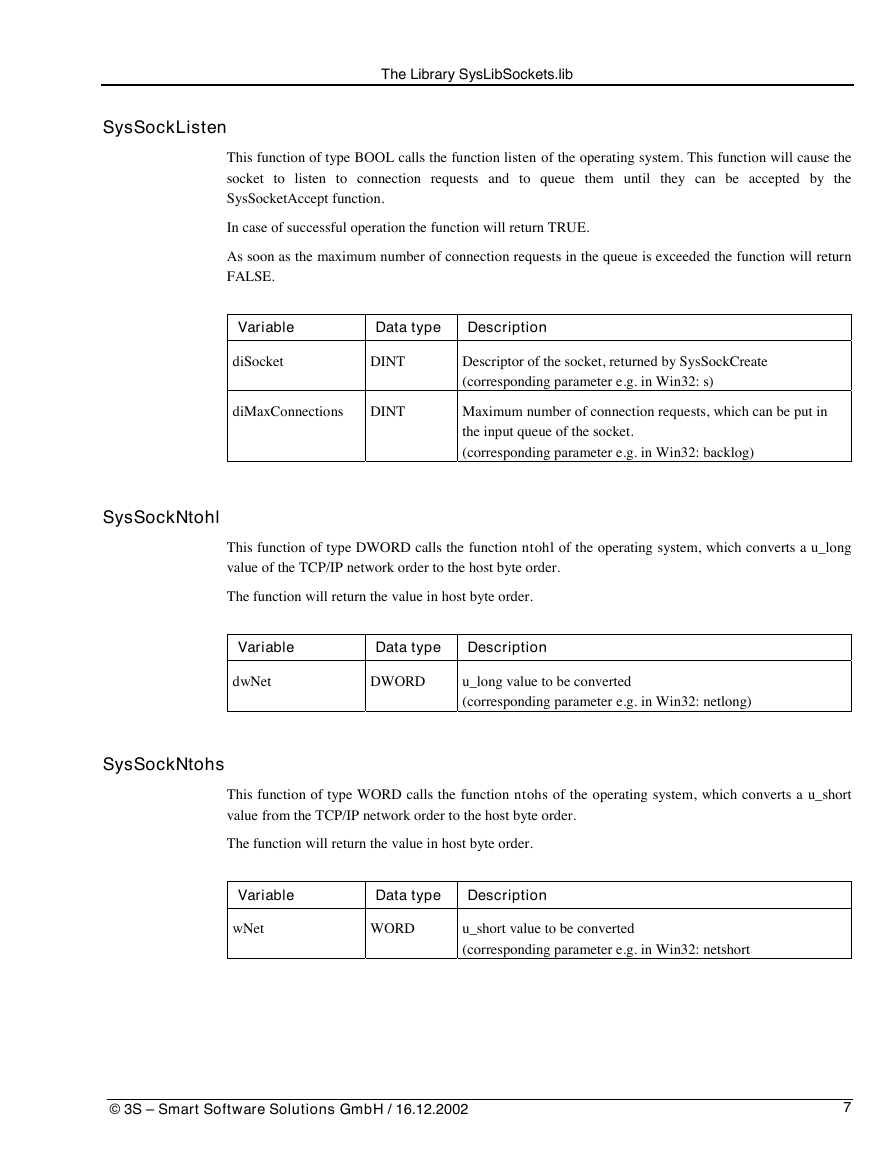
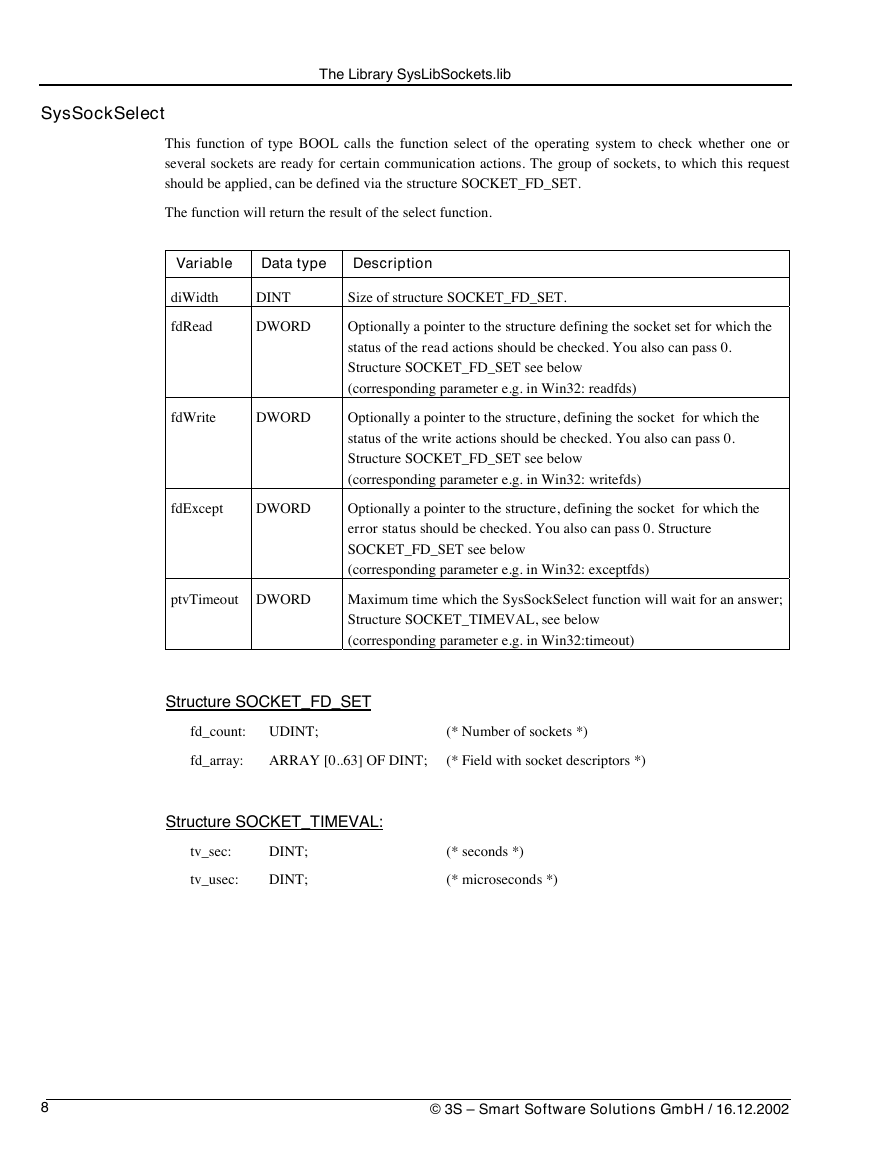








 2023年江西萍乡中考道德与法治真题及答案.doc
2023年江西萍乡中考道德与法治真题及答案.doc 2012年重庆南川中考生物真题及答案.doc
2012年重庆南川中考生物真题及答案.doc 2013年江西师范大学地理学综合及文艺理论基础考研真题.doc
2013年江西师范大学地理学综合及文艺理论基础考研真题.doc 2020年四川甘孜小升初语文真题及答案I卷.doc
2020年四川甘孜小升初语文真题及答案I卷.doc 2020年注册岩土工程师专业基础考试真题及答案.doc
2020年注册岩土工程师专业基础考试真题及答案.doc 2023-2024学年福建省厦门市九年级上学期数学月考试题及答案.doc
2023-2024学年福建省厦门市九年级上学期数学月考试题及答案.doc 2021-2022学年辽宁省沈阳市大东区九年级上学期语文期末试题及答案.doc
2021-2022学年辽宁省沈阳市大东区九年级上学期语文期末试题及答案.doc 2022-2023学年北京东城区初三第一学期物理期末试卷及答案.doc
2022-2023学年北京东城区初三第一学期物理期末试卷及答案.doc 2018上半年江西教师资格初中地理学科知识与教学能力真题及答案.doc
2018上半年江西教师资格初中地理学科知识与教学能力真题及答案.doc 2012年河北国家公务员申论考试真题及答案-省级.doc
2012年河北国家公务员申论考试真题及答案-省级.doc 2020-2021学年江苏省扬州市江都区邵樊片九年级上学期数学第一次质量检测试题及答案.doc
2020-2021学年江苏省扬州市江都区邵樊片九年级上学期数学第一次质量检测试题及答案.doc 2022下半年黑龙江教师资格证中学综合素质真题及答案.doc
2022下半年黑龙江教师资格证中学综合素质真题及答案.doc